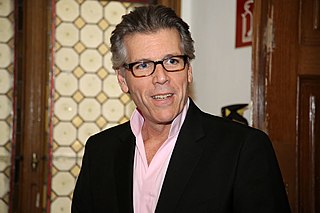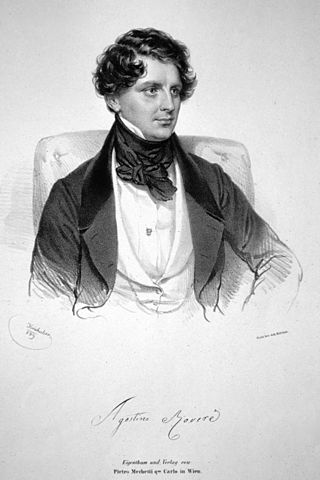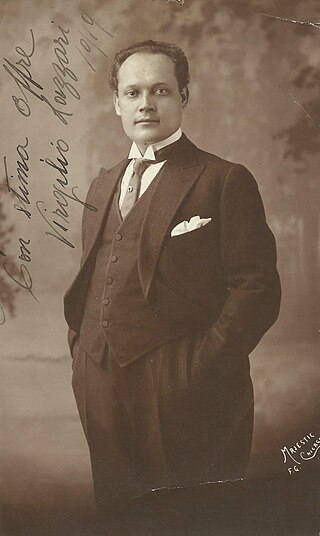Related Research Articles

Don Giovanni is an opera in two acts with music by Wolfgang Amadeus Mozart to an Italian libretto by Lorenzo Da Ponte. Its subject is a centuries-old Spanish legend about a libertine as told by playwright Tirso de Molina in his 1630 play El burlador de Sevilla y convidado de piedra. It is a dramma giocoso blending comedy, melodrama and supernatural elements. It was premiered by the Prague Italian opera at the National Theater, now called the Estates Theatre, on 29 October 1787. Don Giovanni is regarded as one of the greatest operas of all time and has proved a fruitful subject for commentary in its own right; critic Fiona Maddocks has described it as one of Mozart's "trio of masterpieces with librettos by Da Ponte".

Thomas Walter Hampson is an American lyric baritone, a classical singer who has appeared world-wide in major opera houses and concert halls and made over 170 musical recordings.

Busseto is a comune in the province of Parma, in Emilia-Romagna in Northern Italy with about 6,763 inhabitants. Its history is quite well documented back to the 10th century, and for almost five hundred years it was the capital of Stato Pallavicino, which eventually became part of the Duchy of Parma. The town is about 8 kilometres (5.0 mi) south of Cremona in Lombardy.
Gösta Winbergh was a Swedish tenor.
Ferruccio Furlanetto is an Italian bass. His professional debut was in 1974 in Lonigo, he debuted at the Teatro alla Scala in Milan in 1979, in a production of Verdi's Macbeth, conducted by Claudio Abbado. He has gone on to sing numerous roles, including both Don Giovanni and Leporello in Mozart's Don Giovanni, Philip II in Verdi's Don Carlos, Figaro in Mozart's Le nozze di Figaro, Gremin in Tchaikovsky's Eugene Onegin, Zaccaria in Verdi's Nabucco, Méphistophélès in Gounod's Faust, Orestes in Strauss' Elektra, Fiesco in Verdi's Simon Boccanegra, the title role of Mussorgsky's Boris Godunov, as well as many other roles.

Antonio Pini-Corsi was an Dalmatian Italian operatic baritone of international renown. He possessed a ripe-toned voice of great flexibility and displayed tremendous skill at patter singing. Pini-Corsi participated in numerous operatic premieres, portraying on stage such characters as Ford in Giuseppe Verdi's Falstaff and Schaunard in Giacomo Puccini's La bohème. Part of the first generation of recorded musicians, Pini-Corsi was one of the finest buffo singers of his era.

José Francisco Araiza Andrade is a Mexican operatic tenor and lied singer who has sung as soloist in leading concert halls and in leading tenor operatic roles in the major opera houses of Europe and North America during the course of a lengthy career. Born in Mexico City, he studied singing at the Conservatorio Nacional de Música de México and later in Germany, with Mozartian tenor Richard Holm, and lieder interpretation with Erik Werba. He made his operatic debut in 1970 in Mexico City as First Prisoner in Beethoven's Fidelio. Araiza initially came to international prominence singing in Mozart and Rossini operas, but in the 1980s broadened his repertoire to include Italian and French lyric tenor roles and Wagnerian roles such as Lohengrin and Walther von Stolzing. He was made a Kammersänger of the Vienna State Opera in 1988. Now retired from the opera stage, he teaches singing and serves on the juries of several international singing competitions.

Erwin Schrott is an Uraguayan operatic bass-baritone, particularly known for the title role of Mozart's Don Giovanni.
Alessandro Corbelli is an Italian baritone opera singer. One of the world's pre-eminent singers specializing in Mozart and Rossini, Corbelli has sung in many major opera houses around the world and won admiration for his elegant singing style and sharp characterizations, especially in comic roles.

Rolando Panerai was an Italian baritone, particularly associated with the Italian repertoire. He performed at La Scala in Milan, often alongside Maria Callas and Giuseppe Di Stefano. He was known for musical understanding, excellent diction and versatile acting in both drama and comic opera. Among his signature roles were Ford in Verdi's Falstaff and the title role of Puccini's Gianni Schicchi.

Mario Petri was an Italian operatic bass-baritone particularly associated with Mozart and Rossini roles.
Richard Van Allan CBE was a versatile British operatic bass singer who had a lengthy career.
Donald John Gramm was an American bass-baritone whose career was divided between opera and concert performances. His appearances were primarily limited to the United States, which at the time was unusual for an American singer. John Rockwell of The New York Times described Gramm as follows: "He had an unusually rich, noble tone, and although its volume may not have been large, it penetrated even the biggest theaters easily. Technically, he could handle bel-canto ornamentation fluently. But his real strengths lay in his aristocratic musicianship and his instinctive acting." Among the most notable of his many operatic roles were the title role in Verdi's Falstaff, Leporello in Mozart's Don Giovanni, and Dr. Schön and Jack the Ripper in Berg's Lulu.

Agostino Rovere was an Italian operatic bass.

Juan Francisco Gatell (born November 28, 1978, in La Plata, Argentina Juan Francisco Gatell is an Argentinian operatic tenor who specialises in the bel canto repertoire.
Juha Petteri Salomaa is a Finnish operatic bass-baritone who has had an active international singing career in operas and concerts since the late 1970s. He has performed on more than 30 recordings with a variety of record labels, including Decca Records, Deutsche Grammophon, Harmonia Mundi, HMV, and Philips Records among others. He taught on the voice faculty at the Sibelius Academy from 2003–2008, and currently serves as a visiting professor of singing at the Royal College of Music, Stockholm.

Virgilio Lazzari was an Italian operatic bass who had an active international performance career from 1908 to 1953. He had lengthy associations with the Chicago Civic Opera (1918–1932) and the Metropolitan Opera (1933–1950), and frequently performed at the Salzburg Festival during the 1930s. He appeared as a guest artist with opera houses internationally, including the Royal Opera House, the Teatro Colón, and the Teatro Carlo Felice among others.
Luise Helletsgruber was an Austrian operatic soprano, who performed at the Vienna State Opera, the Salzburg Festival and the Glyndebourne Festival Opera.
Michele Pertusi is an Italian opera singer (bass) born in Parma on January 12, 1965.

Mika Kares is a Finnish operatic bass in opera and concert who made an international career. He was first based at the Badisches Staatstheater Karlsruhe, and went on to the Savonlinna Opera Festival, the Palau de les Arts Reina Sofía in Valencia, and the Seattle Opera, among others.
References
Notes
- 1 2 3 4 5 Picard, Anna. "People: 418. Luca Pisaroni", Opera , January 2014, Vol. 65, No. 1, pp. 6—13.
- 1 2 3 Gazzola interview in Opera Lively
- ↑ Full biography on imgartists.com, retrieved 20 June 2010.
- ↑ Salzburger Festspiele 2007, retrieved 4 April 2008.
- ↑ "La Cenerentola" on metoperafamily.org Retrieved 5 January 2014
- ↑ Picard, p. 6: She notes that, having settled in Vienna, "[he] believes himself to be mitteleuropäisch by nature"
Sources
- Gazzola, Luiz (Almaviva),"Opera Lively Exclusive Interview with Luca Pisaroni", 7 May 2012 on operalively.com